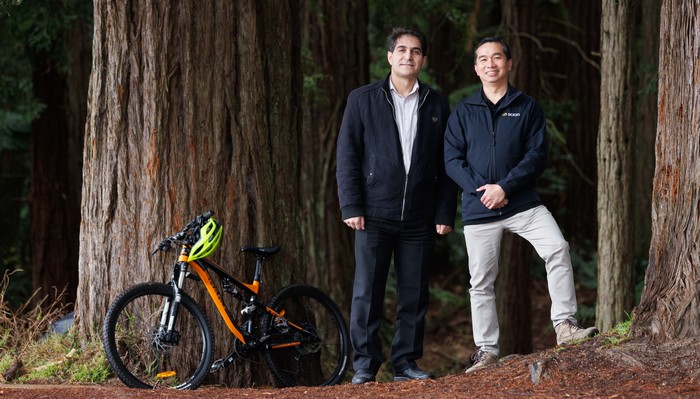Planted forests a big economic contributor
Mountain biking tourism pumps $112m into the NZ economy each year and employs hundreds.
Planted forests are currently the most important mountain biking destinations in New Zealand, new research has found.
As a major driver of activity in the regions, several sectors, including tourism, reap the economic benefits of mountain biking.

In a research project funded by Forest Growers Research, Scion senior research economist Dr Richard Yao and resource economists Julio Botero and Saeed Solaymani looked at the economic value of mountain biking and its wellbeing benefits. They also looked at the role of planted forests compared to other mountain biking destinations.
Findings show mountain biking tourism pumps $112.3 million into the New Zealand economy each year providing full-time employment for hundreds nationwide.
Most of the economic benefits went to five sectors: transport (18%), accommodation (16%), rental and hiring services (14%), food and beverage services (14%), and retail trade (11%). Forestry reaped 0.5% of benefits.
Yao says, “while the economic benefits derived directly from mountain biking in the forestry sector may be relatively small, the contributions of forestry assets to mountain biking activities are significant”.
As part of the research, carried out in May and June 2023, thousands of mountain bikers were surveyed about where they biked and their relevant spending.
The researchers used an input-output model to assess economic impacts and found mountain biking generated $112.3m. Of this, transport contributed $20.2m from expenses like air travel, petrol, and shuttles. Accommodation made up $17.6m, rental and hire services $16.3m and food and beverage contributed $15.2m.
Retail contributed $12m, manufacturing, professional services, construction, primary manufacturing and financial and insurance contributed a collective $18.9m and other sectors contributed $11.5m. Forestry received $261,000 of economic benefits.
The report says the findings highlight the “diverse industries” that benefit from mountain biking visits and how these contribute to economic growth.
While the economic benefits derived directly from mountain biking in the forestry sector may be relatively small, the contributions of forestry assets to mountain biking activities are significant. - Richard Yao
Frequency and distance
Of the 2073 mountain bikers surveyed, 79% biked at least once a week, and 91% went on distant trips (more than 120-minutes one-way).
Seven of the 10 most visited local sites were in planted forests, with Whakarewarewa Forest taking the top spot with 36.3% of visitors followed by Wellington’s Mākara Peak (14.8%) and Woodhill in Auckland (10.8%).
Four of the 10 most visited sites by distant visitors were planted forests.
The team used survey data to simulate ‘what if’ scenarios determining the impact locations had on distant mountain biking visitors’ wellbeing.
Using the travel cost economic valuation model, they assessed the additional satisfaction derived from mountain biking activities. The model considered the opportunity cost of travel time and the expenses associated with traveling to and from the site, as these factors could reflect the value of the trip to an individual (e.g. their willingness to spend both time and money on the trip).
The opportunity cost of travel time was estimated using an equation that considers an individual’s hourly wage and round-trip travel time.
This information was then used to evaluate the impact of not allowing distant visitors to mountain bike in the four most-frequented planted forest sites (Whakarewarewa, Queenstown Bike Park, Christchurch Adventure Park and Hanmer Forest Park). The analysis shows a cumulative loss in wellbeing value of about $4.2m per year for distant visitors based on a travel cost analysis.
Yao says if the other six non-planted forest sites closed this would lead to a wellbeing reduction of $2.6m illustrating the higher contribution planted forests make to the wellbeing of mountain bikers.
He says the outcomes from the multi-site travel cost model show that the value of the extra satisfaction derived from visiting the top four planted forest locations surpasses that of visiting the leading six non-planted forest sites.
The non-planted forest sites included Paparoa National Park, Coronet Peak, The Gorge Mountain Bike Park, Park Glendhu Bike Park, Great Lake Trails and Craigieburn Trail.
“This emphasises the higher value placed on planted forests as mountain biking sites,” Yao says.
He says one explanation could be the quality and convenience of trails, or the wider variability of the trail challenge levels found in planted forests. Factors explaining why mountain biking sites in planted forests might be valued more than other areas will be determined in a future study.
Cyclists’ spending
The survey also asked respondents how much they spent on mountain biking.
Local visitors spent an average of $735 on food and drinks, $694 on transport, $2032 on access fees or entry permits, $2655 on gondola rides, lifts, and shuttle fees, and $4592 for bike or gear rentals.
Distant visitors spent an average $7814 on food and drinks including dining out, $8504 on transport, $3223 on access, $4657 on gondola and shuttle rides, $6311 on bike or gear rentals and a whopping $11,963 on accommodation per year.
Retail and rental and hiring services predominantly benefit from local mountain biking visits while distant visits benefit accommodation, transport and food and beverage sectors. The study also looked at jobs created through mountain biking, concluding local visitors generated 30 full-time equivalent (FTE) jobs while distant visitors created 137 FTE in the Bay of Plenty alone. Nationwide, more than 700 FTE were created.
The research was funded by Forest Growers Research. Chief executive Paul Adams says the research provided interesting insights and prompted questions around how forest growers could leverage the economic benefits.
A 2022 report called Impact of Mountain Biking assessed how much mountain biking related visitors spent in Rotorua and estimated they contributed a total of $139.8m to the local economy. The report used different research methods and analysis models, drawing on a range of data sources, while this study drew directly on the survey results.
